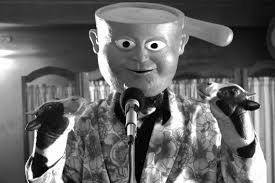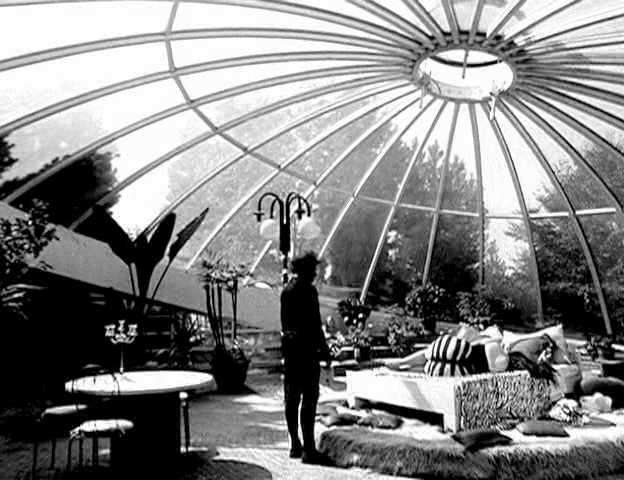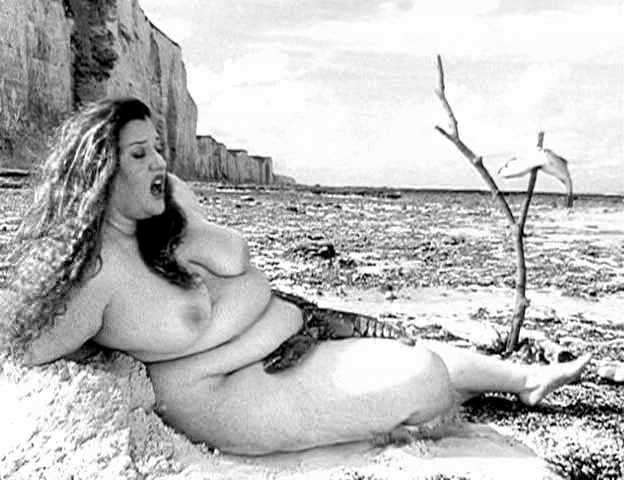At once, this scene tells us everything we need to know. about the film we are about to watch; we are in for an existential comedy, one that may surprise us. Why? Because those we least expect to succeed may, in fact, perservere, while others may be ignored, their corpses left in the street and merely pushed out of the way by the indifference (or automatic gate door) of a more economically privileged human.
Bob Freville
The French Do It Better: Avida by Bob Freville
It’s true what they say, you know. The French do it like dogs, but they do it better than we ever could. If you want weird and you’ve never set foot outside the sandbox of American bizarro, you are missing out, brothers and sisters. Before you explore the enchanting abbatoir of Jeunet et Caro’s Delicatessan or the ineffably strange role reversal horror of Fabrice du Welz’s Calvaire, AKA The Ordeal, consider the works of Kervern and Delepine.
Frankly, I am appalled by how many so-called fans of the weird watch and recommend all of the same shit—Santa Sangre this and A Serbian Film that—and never once, not one single time within my eight years of combing through their blog entries, social media posts, carefully concealed diaries, stool samples, private exchanges with loved ones, have these Jodorowdy Lynchpinheaded Waterheads ever shown any appreciation for our fiendish friends, the frogs. More specifically, I’m talking about Gustave Kervern and Benoit Delepine, better known as Kervern et Delepine, Kervern + Delepine or, more simply, VernPeen (in my imagination anyway).

These Brie-gluttonizing, Bordeaux-swilling basket cases have made a career out of the comedy of confrontation and defiance. Theirs is a special brand of punk rock filmmaking, one which refuses to play by the rules of traditional auteur theory as we know it.
Most folks in the Western world get their jollies by pigeonholing people, but across VernPeen’s fourteen-plus big-screen collabs, these Camembert-humping heretics have been nothing if not consistently inconsistent. From the handicapable comedy of Aaltra to the existential Friday the 13th– centric suicide satire Near Death Experience (starring the impishly cantankerous Michel Houellebecq), VernPeen have made some of the most random movies on earth.
I fell into a deep spiral of obsession with these two bastards after discovering their film, Aaltra, an anti- buddy comedy about two warring neighbors whose mutual acrimony leaves them both confined to electric wheelchairs and neck braces. What starts as a rural turf war swiftly becomes a dryly hilarious and blunt road movie.
Watching your first VernPeen film is a revelation on par with becoming a martyr, bearing witness to a sight most uncanny, unusual, and beatific. As actors, VernPenn are the epitome of outside Hollywood; Kervern, AKA K/Vern is a large, scruffy bear with white mutton chops and a pitch black handlebar mustache, his exagerrated features and thinning head of dandelion hair deliberately conjured; Delepine is a rakish gentleman with an incredible mop, piercing blue eyes, and a soul patch to prove he has a sense of humor.

These two men could not be more different—Delepine looks like he could be a member of U2 or, perhaps, Bill Pullman’s twin brother, while Kervern looks like he emerged from a Dr. Seuss book or some long-secreted-away Roald Dahl novel—and, yet, they mesh perfectly, their tastes fully aligned.
In my January, 2020 review for the now-defunct Silent Motorist Media, I said, “Some films have the ability to leave you in awe, while others are in possession of something capable of driving you mad. Delépine and Kervern’s directorial debut, the nebulously titled Aaltra, is in full possession of both.”
I went on to describe VernPeen’s directorial debut thusly:
“As the two men wrestle, their bodies land in the gaping maw of Gus’s combine harvester. The machine swallows them up, leaving each of them paralyzed below the waist. After realizing that they are both F.U.B.A.R., they begrudgingly decide to team up to take on the corporate bigwigs at Aaltra, the manufacturer of the offending combine.
“Naturally, a sort of stand-offish camaraderie develops between the two, one that would be easy to picture drowning in saccharine if placed within the wrong hands. Fortunately for us, Delépine and Kervern are not the wrong hands and Aaltra is not that sort of movie… it flies in the face of our collective understanding of narrative composition.”
It’s true what they say, you know. The French do it like dogs, but they do it better than we ever could. In VernPeen’s case, they do it with a beautifully consistent inconsistency. Case in point: Avida. This 2006 ensemble comedy abandons the anti-buddy comedy format of their debut in favor of a rambling bizarro collage about zookeepers-cum-kidnappers intent on punishing the wealthy matriarchy by stealing a rich bitch’s dog.
But the opening of the film tells us nothing of this grand scheme. Instead, VernPeen establish an oddly Dadaist approach to body positivity before abandoning this approach for an altogether more peculiar one.

We open on an erotic extreme close-up of two glossy lips moving with a rhythm that seems familiar from a specific act of pleasure, only to discover at once that the source of this rhythm is another act of pleasure entirely, one more gastronomical.
VernPenn then cut to a diminutive old matador kneeling on a small sofa and praying to Topor or, perhaps, Torpor (a state of physical and mental inertia). “I shall kill myself,” the matador says. “and rise into heaven with you like a re-enrosed horsewoman who attends the roseteria springing to the ceiling and at half-past midnight sharp, we will be in water, wet, two meters deep. Farewell, my friend.”
At least, that is what the subtitles say on the English DVD from Cinema Epoch. It’s just bizarre enough to be a crude mistake by someone with a poor understanding of conversational French, but, also, just weird enough to be classic Kervern + Delepine. The acting-directing duo got their start as comedians embodying a surrealist branch of confrontrational humour.
Cut to a dark cavernous tunnel where the trembling matador prepares himself for his inevitable fate and he is overseen by a laconic man in all black (Delepine) and a long-haired bean counter. In the stark black-and-white environs of the tunnel, there is no hope for the matador, the only lodestar shining from the Heavens a single exposed lightbulb dangling from a janky chain.
The man in black ushers the matador to the other end of the tunnel and shrugs, as if to say, “Hey, this is life.” The matador accepts his fate and heads out, chasing after a… rhinocerous… with a spear? The matador charges out of frame, screaming, “Long live death!”
If this scene doesn’t perfectly encapsulate the proprietary absurdism of VernPeen, I don’t know what would. We never see the matador again, for he has very clearly been gored to death by the rhinocerous, who returns to frame trying to nonchalantly shake off the spear that’s been driven through its neck.
At once, this scene tells us everything we need to know. about the film we are about to watch; we are in for an existential comedy, one that may surprise us. Why? Because those we least expect to succeed may, in fact, perservere, while others may be ignored, their corpses left in the street and merely pushed out of the way by the indifference (or automatic gate door) of a more economically privileged human.
While a rich man ruminates in his posh living room, the rotund zookeeper (Kervern) trains a vicious dog to bite the head off a baby doll. He then appears on the roof of the rich man’s home, stuffing a tree down his chimney and setting it on fire. The rich man appears unfazed until smoke overwhelms his spacious living room.
Spotting the wild-eyed gargantuan in his backyard, the rich man naturally pulls a shotgun and fires it in his direction. There’s only one problem (for the rich man): he neglected to remember his window was shatterproof and the buckshot bounces back, killing him on the spot.
I could tell you what happens next (the abrupt wrestling, the hand reaching for the heavens and seeming to fondle a cloud like an infantile god, the scene of Kevern’s manchild lashing out at the air with shrubbery while a clock tower’s hands race around suggesting Don Quixote’s battle with a windmill, a man with his nose taped to the side of his face, a nauseating bit of taxidermy, the horror movie pursuit of Aki Kaurismaki regular Kati Outinen into a desolate field and the shrewdly hilarious developments that follow) but this would be to rob you of an experience you won’t get anywhere else.
Not even Kaurismaki at his weirdest (Leningrad Cowboys Meet Moses) or goofiest (Calamari Union, Hamlet Goes Business) could pull off the genuinely subversive and unpredictable genre juggling act that VernPeen manage in their sophomore effort as actor-writer-director-control-freaks.
This starkly lensed quasi-comedy is nothing if not wholly unique, evoking everything from the aforementioned Jodorowsky and avant-garde performance art to Bergman and Lynch at their best. Is it significantly darker than the ‘plegics on parade comedy of Aaltra? Mos‘ def.
Does it feel borderline exploitative at times? What experimental movie doesn’t? One gets the distinct impression that Kervern and Delepine were influenced as much by mid-90s American indie weirdness (Korine’s Gummo and Crispin Glover’s What Is It?) as they were by anything from France’s long tradition of boundary-pushing absurdism (Perec, et al.).
In typically defiant fashion, the titular Avida (plus-size model Velvet D’Amour) doesn’t even show up (not really anyway, though part of her anatomy is omnipresent) until more than halfway through the 83- minute film, and her role is as opaquely defined as that of the main zookeeper, a man who seems more fixated on trees than he does on animals.
Avida is not the kind of film you watch casually. Unless, of course, your idea of casual viewing involves consumption of mild hallucinogens. In which case, you may enjoy this strange hodgepodge, which doesn’t so much match the dry wit and subtle commentary of its predecessor as lash out at the idea of what constitutes art. At times, Avida feels like you are watching some terrible collision, but you can’t look away from the wreckage.
If you prefer your weird with a bit more narrative meat, I would suggest starting elsewhere as Avida comes as close as any narrative horror-comedy has come to the navel-gazing of the old-school avant- garde. This flick makes Jodorowsky’s Fando y Lis look like Bonnie & Clyde by comparison. If, on the
other hand, you don’t mind weirdness for weirdness’s sake, then you’ll dig this Frankenfruitcake of a flick.
When I have to summarize it for a friend, I usually scream into my curled fist. Then I say, “It’s like Pierre Etaix and Jacques Tati ate fungus and binged Even Dwarfs Started Small and The Exterminating Angel before puking in each others’ laps.”
If you are anything like me, the ending will piss you right off, and maybe that’s the point: Good Art should make us angry and force us to confront those feelings. Or maybe VernPeen are just taking the piss.
All I can say is, I feel sorry for the inhabitants of the bistro fish tank… because I feel like they are us.
Bob Freville is a writer, producer and director from New York. His LoFi vampire film Hemo was released by Troma. His X-rated bikersploitation novella The Filthy Marauders is available from The Evil Cookie Publishing. He is the writer-producer of the forthcoming Norwegian drug comedy The Scavengers of Stavanger. Look inside his head: @bobfreville

